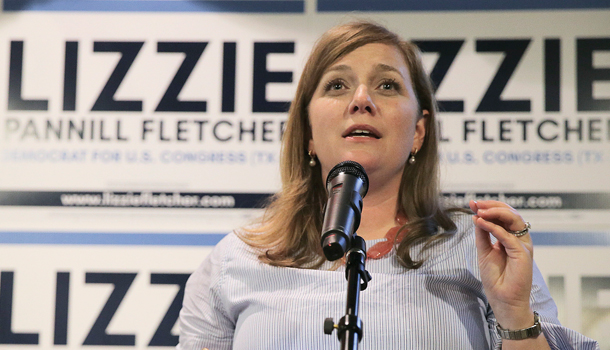
War for the West
Lizzie Pannill Fletcher takes on anti-LGBTQ Congressman John Culberson in critical Houston House race.
It is the year of the woman in American politics. Two hundred fifty-seven female candidates are running for the House and Senate in the general election, 197 of them Democrats. This follows the largest number of primary-race victories by female candidates in the nation’s history.

One closely watched race is playing out in Texas’ 7th Congressional District, which stretches from West University Place through Gulfton to the Energy Corridor on Houston’s west side. After five decades of Republican dominance, Democrat Lizzie Pannill Fletcher is taking on 17-year GOP incumbent John Culberson in a race that has emerged as a dead heat, according to polls. For Democrats, flipping District 7 is crucial to the party’s larger goal of recapturing a House majority.
George Will, conservative columnist of the Washington Post, has called Fletcher’s strategy “a Democratic template for victory in 2020,” observing “a Fletcher victory in the 7th Congressional District could be an early tremor of a political earthquake.” The Atlantic has called the race “the future of Texas politics,” noting, “As the state undergoes a demographic transformation with the political shifts to match, the question for some political analysts has become not if Texas will turn blue, but when. So it has with the Seventh.”
Fletcher is a political thoroughbred. Having never before run for office, the 43-year-old Houston attorney burst forth in March from a pack of seven talented candidates, winning the most votes in the primary before defeating Laura Moser in a runoff. In its endorsement, the Houston Chronicle editorial board lauded Fletcher’s “deep understanding of complex public-policy matters.” It also noted that her “intelligent and level-headed pragmatism will appeal to the moderate voters of this district, whose support Democrats will need if they’re serious about defeating Culberson.” In a heated spring runoff with progressive activist Laura Moser, Fletcher scored a commanding victory.
She has racked up a slew of endorsements, from former vice president Joe Biden and the Houston GLBT Political Caucus to Emily’s List and the Human Rights Campaign. The national Democratic Party has sent its stars to Texas to campaign for her, including senator Cory Booker, Paul Begala, and congresswoman Gabby Giffords.
Fletcher has proven to be an impressive fundraiser, hauling in more than $1 million in the second quarter of 2018 and besting Culberson by $200,000. Overall, she had raised more than $2 million as of July. She has built a campaign staff of seven full-time employees that is being led by campaign manager Erin Mincberg, daughter of former Harris County Democratic Party chair David Mincberg. She is a seasoned campaign professional with extensive experience in California, where she served as finance director for then attorney general Kamala Harris for four years.

Fletcher took to the airwaves early in September, placing a six-figure TV ad buy to air a commercial stressing that she would bring a bipartisan approach and a sunny, can-do optimism to the challenge of moving past the political gridlock wracking Washington. The Democratic Congressional Campaign Committee is also investing $2 million in support of Fletcher in a six-week broadcast and cable buy that began in September.
Republicans are pushing back ferociously, with vice president Mike Pence and House speaker Paul Ryan travelling to Houston to raise money for Culberson. The GOP started attack ads against Fletcher in mid-September.
“Culberson’s decision to launch negative ads against Lizzie means they are worried they will lose,” observes veteran lesbian politico Sue Lovell, whom Fletcher considers a mentor. “The only time you really run negative ads is when you feel like you are behind. That’s especially true if you are an incumbent.”
Brandon Rottinghaus, a political-science professor at the University of Houston, says college-educated working women will be the swing vote that decides the race.
“Women, especially those with college educations and who work, will be the key swing vote that will decide this election,” observes the University of Houston Political Science professor.
“Fletcher being female will help, but she still needs to connect her gender to issues women care about,” Rottinghaus says. “The district has historically been one that elects moderates—especially the parts of the district where Fletcher did well in the primary. President Trump is not well-liked by many Republicans in the district, and his unpopularity may drag down the Republican ticket statewide and especially in the 7th District.”
Rottinghaus adds that Fletcher’s biggest hurdle will be turnout among core Democratic groups, “especially younger voters, those new to the district, and Latinos. The western portion of the district is newer and more transient, making mobilization and turnout more challenging,” he says.
Born in Houston, Fletcher grew up in Afton Oaks and attended the prestigious St. John’s School. Her mother had a library-science degree, but ended up taking over the family’s building-materials business. Fletcher’s father was an attorney. “When I was growing up, my dad used to tell me that I would be a lawyer because I was the only one who could argue with him and win,” she recalls with a laugh.
She comes from a family of high achievers. Her sister is acclaimed writer Katherine Center, who released her latest book, How to Walk Away, during the same week in May that Fletcher won the runoff.
While in high school, Fletcher joined a group called Young Adults for Reproductive Rights. During the 1992 Republican National Convention, she volunteered for clinic defense at Planned Parenthood health centers in the face of demonstrations by the anti-choice group Operation Rescue. “It was really formative for me,” she recalls. “There were so many people who were passionate about protecting the right to choose and [making sure] that other people had a voice. I saw how much you could do when you stood up for your values.”
She attended Kenyon College, majoring in history and graduating Phi Beta Kappa. She then worked for four years at the Alley Theatre, where she experienced the havoc when Tropical Storm Allison devastated the theater in 2001, destroying its Neuhaus Arena Stage and scene shop. “The building had a long renovation,” she observes. “I learned a lot about crisis management.” Also during those years at the Alley, she co-founded Planned Parenthood’s Young Leaders to develop the organization’s next generation of patrons and supporters.
She won a fellowship to attend William and Mary Law School in Virginia, where she served as editor-in-chief of the law review. She began her law career at Houston’s blue-chip firm Vinson & Elkins, and went on to join Ahmad, Zavitsanos, Anaipakos, Alavi & Mensing, where she became the firm’s first female partner and met her husband, Scott.
Her opponent, Culberson, is a tea-party Republican who has voted with Trump 98 percent of the time. Culberson supports the president’s plan to build a border wall between Texas and Mexico. He has received ratings of zero on congressional scorecards of the Human Rights Campaign, the Leadership Conference on Civil and Human Rights, and the Planned Parenthood Action Fund. He has worked zealously to dismantle the Affordable Care Act (ACA), calling it “disastrous” and voting multiple times to repeal it. (Curiously, his campaign website makes no mention at all of healthcare, nor of his antipathy toward Obamacare.)
By contrast, Fletcher is quick to point out that if the ACA is repealed, 339,000 residents in District 7 could lose health insurance due to pre-existing conditions such as cancer and diabetes. “Healthcare is head-and-shoulders above everything else,” she says of the key issues in her campaign.
“When you talk to people, everybody agrees that there’s room to improve the ACA,” she notes. “It was a compromise. There’s been a concerted effort by the GOP to make sure that it fails. They’ve cut the budget for advertising the ACA, and cut the ability to do open enrollment by shutting down the websites on Sunday.”
To strengthen the ACA, she has called for increasing and fully funding subsidies that reduce co-pays and lower deductibles for working families. She also wants to lower the cost of prescription drugs by allowing Medicare to negotiate with drug companies to lower costs. And she is a fierce defender of maintaining protections for individuals with pre-existing conditions.
On LGBTQ rights, Fletcher has committed to fighting for passage of the Equality Act, which would add federal nondiscrimination protections in housing, employment, and public accommodations. She has also committed to passing the Safe Schools Improvement Act to combat bullying and harassment of LGBTQ students.
Meanwhile, with the race entering its final stages, Culberson’s campaign has been dogged with questions of ethical improprieties. On August 8, New York Republican Chris Collins was indicted for insider trading of an Australian biotech stock. Culberson sold his shares of the same stock 10 days before the crisis came to a head, thus avoiding significant financial losses. Culberson contends that he discovered the stock through reading, but Fletcher has asserted that he has not adequately answered questions about what information he received from Collins about the stock.
At the end of August, it was revealed that Culberson had spent $50,000 in campaign funds on books, collectibles, and Civil War memorabilia. He defended the purchases, justifying them as small gifts for campaign donors and volunteers. He said he bought the books to do research on global warming—a curious position for a legislator who in the past has questioned the validity of man-made climate change.
Fletcher has attacked Culberson on these two issues, which dovetail with a larger political narrative of a GOP culture of corruption that is playing out nationally. She has asserted that Culberson “is exactly what is wrong with Washington.”
According to Rottinghaus, the ethical questions bedeviling Culberson are having an impact. “Scandals hurt incumbents more when they are recent, financial in nature, especially related to potential corruption, and when the matter is investigated by Congress,” he observes. “All of these factors apply and will hurt Culberson in the general.”
On October 15, the two candidates will face off in person at the University of Houston in a debate that will be televised by KTRK/Channel 13.
“Flooding mitigation and healthcare are the two biggest issues,” Rottinghaus says. “Whoever wins on those issues by being perceived to be more credible and effective will win this race.”
This article appears in the October 2018 edition of OutSmart magazine.











FB Comments